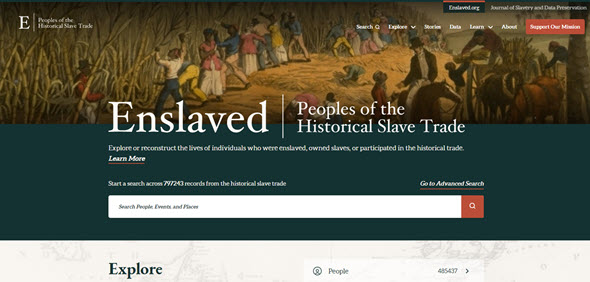Recording the data of the enslaved
The Legal Genealogist is often asked the same question about researching the enslaved.
“Where can I record the information I find about enslaved persons that I come across in my family research?”
And — sigh — every time that question comes in, I wish there was one single Right Answer (in capital letters) that would mean the information being uncovered about those held in bondage could be easily recorded and readily available to all.
As yet, there is no one database, no one website, no one repository for this material.
But that doesn’t mean there aren’t options, and good ones, that may someday end up being integrated in a way that makes sense for all researchers.
So… here are my top three options for right now.
First, for individuals and groups who want to thoroughly explore the relationships between enslaver and enslaved and ensure that the results are preserved, consider the Beyond Kin Project, brainchild of Alabama genealogists Donna Cox Baker and Frazine K. Taylor. The Project offers both a means to preserve individual data and a guide to methodology for this sort of research.1
For those who have encountered records mentioning the enslaved and simply want to ensure that the data isn’t lost, the Slave Data Collection of AfriGeneas, where the group’s vision is to “find and document the last slaveholder and the first African in each family” and its goal to “encourage and support all African ancestored individuals and families to begin and continue researching their roots until all possible resources are exhausted and the results are published.”2
Finally, for archives, groups, individuals and others with “historically significant” datasets, consider submitting to Enslaved: Peoples of the Historical Slave Trade — a collaborative effort by Matrix: Center for Digital Humanities & Social Sciences at Michigan State University (MSU), in partnership with the MSU Department of History, the College of Arts and Humanities at the University of Maryland, The Andrew W. Mellon Foundation, and scholars at multiple institutions of education, research, and public exhibition. The scholarly focus of the website allows researchers to access “information on hundreds of thousands of individuals involved in the historical slave trade — including enslaved people, slave owners, and slave traders.”3
With luck, eventually, we will have a single repository at some point. But in the meantime we can still record that data. Whichever repository we choose — whether one of these or any others we come across — is less important than choosing one and making sure the data is recorded and shared.
Cite/link to this post: Judy G. Russell, “Remember their names,” The Legal Genealogist (https://www.legalgenealogist.com/blog : posted 23 Mar 2021).
SOURCES
- See “Descendants of slaveowners, do we still hold a key?,” Beyond Kin Project (https://beyondkin.org/ : accessed 23 Mar 2021). ↩
- See “Welcome to AfriGeneas!,” AfriGeneas.com (https://www.afrigeneas.com/ : accessed 23 Mar 2021). ↩
- See “Stories,” Enslaved.org (https://enslaved.org/ : accessed 23 Mar 2021). ↩






May I suggest another one? The University of North Carolina, Greensboro (UNCG) “Digital Library on American Slavery” features four records projects: Race and Slavery Petitions, Runaway Slave Ads, People Not Property – Slave Deeds of North Carolina, and Voyages: The Trans-Atlantic Slave Trade Database. https://library.uncg.edu/slavery/
Those are wonderful research resources, but as far as I know the DLAS doesn’t take data from individuals, unless I’ve missed something…
What options are there for those who were free people of color? I encounter deeds from time to time where they were selling or purchasing land. I would love to have a place to list the deeds and the details.
I ran into this several months ago and a very kind person from ourblackancestry.com referred me to the following:
FamilySearch is sponsoring the ROAR Project. They are collecting data to put online sometime in 2021. Our Black Ancestry is a partner in this effort.
https://www.familysearch.org/blog/en/reclaiming-our-african-roots/
She gave me a template and I filled in the information – which was from non-indexed wills I was searching for evidence of my ancestors. Like others, I hated to see the information I came across go neglected.
Thank you for the information. I had not seen this before. A gg-grandfather purchased land from a free man of color in the 1850s in South Carolina. I thought someone might be interested to know.